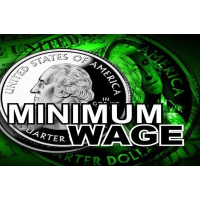If a High Minimum Wage Kills Jobs, How Do You Explain San Francisco?
 (graphic: Associated Press)
(graphic: Associated Press)
Republicans have blocked President Barack Obama's proposal for a national minimum wage boost from $7.25 an hour to $10.10, arguing that it's a jobs killer. But you couldn't prove that by the experience in San Francisco.
The city has a minimum wage of $10.74 and the largest job-growth rate, around 4%, over the past 12 months among the nation's 20 largest metropolitan areas, according to the Paychex/IHS Small Business Jobs Index. The Paychex/IHS survey only covers businesses with fewer than 50 employees. The second-largest increase was Seattle, whose state of Washington had the best jobs performance. Washington also has the highest state minimum wage in the country, $9.32 an hour.
There are, of course, other factors at work in San Francisco's impressive jobs record. The tech sector is soaring and money is flowing into the city. Income inequality is expanding, housing prices are skyrocketing and it's unclear exactly how many low-wage jobs remain there.
But it wouldn't have been totally unreasonable to see a decline in the number of jobs in San Francisco during a steady annual increase in the minimum wage from $8.50 in 2004. The Congressional Budget Office (CBO) published a report in February that projected an increase in the national minimum wage to $10.10 would cause employment to fall by 0.3%. That translates into 500,000 jobs.
That's the number Republicans beat their breasts over. But in exchange, 16 million workers would get a pay increase and 8 million more would have their wages driven higher indirectly. Around 1 million people would statistically rise out of poverty. Most of this would take place in poorer regions of the country and in low-wage industries.
As Kevin Drum points out, though, none of this information about the effects of minimum wage increases is new and probably won't shift the debate much.
The minimum wage reached its peak real value (pdf) in 1968. The nation's growth in productivity had pretty much equaled wage growth since World War II. That hasn't been the case since. If the pace had continued, the minimum wage would have been $21.72 in 2012.
Decades of stagnated wages in the face of productivity growth have driven income inequality to levels not seen since the Gilded Age 100 years ago, Yet, Republicans still sound a lot like GOP Idaho gubernatorial candidate and Bible expert Walt Bayes who told an audience gathered to hear the four candidates debate, “I honestly think half of the Republican Party is Democrats and half of the Democratic Party is Communist.”
That's a little harsh. Republicans have generally considered supporters of raising the minimum wage to be Socialists. Googling “Obama socialist” turns up 39.4 million hits, including links to some nifty T-shirts and entertaining diatribes from Republicans like Senator Rand Paul of Kentucky and conservative commentators like Joseph Farah.
So it wasn't surprising to see journalist Bob Schieffer ask Senator Elizabeth Warren (D-Massachusetts) on CBS's “Face the Nation” two weeks ago to explain why her critics were wrong to call her one. She just laughed and ignored him.
The debate hasn't changed much since President Reagan was elected in 1980.
–Ken Broder
To Learn More:
Show This to the Next Person Who Says High Minimum Wages Kill Jobs (by Emily Cohn, Huffington Post)
Farewell, Unemployment: San Francisco Metro Area Reaches Statistical Full Employment (by Eric Young, San Francisco Business Times)
The Effects of a Minimum-Wage Increase on Employment and Family Income (Congressional Budget Office)
The Minimum Wage Is Too Damn Low (by John Schmitt, Center for Economic and Policy Research) (pdf)
- Top Stories
- Controversies
- Where is the Money Going?
- California and the Nation
- Appointments and Resignations
- Unusual News
- Latest News
- California Forbids U.S. Immigration Agents from Pretending to be Police
- California Lawmakers Urged to Strip “Self-Dealing” Tax Board of Its Duties
- Big Oil’s Grip on California
- Santa Cruz Police See Homeland Security Betrayal in Use of Gang Roundup as Cover for Immigration Raid
- Oil Companies Face Deadline to Stop Polluting California Groundwater





